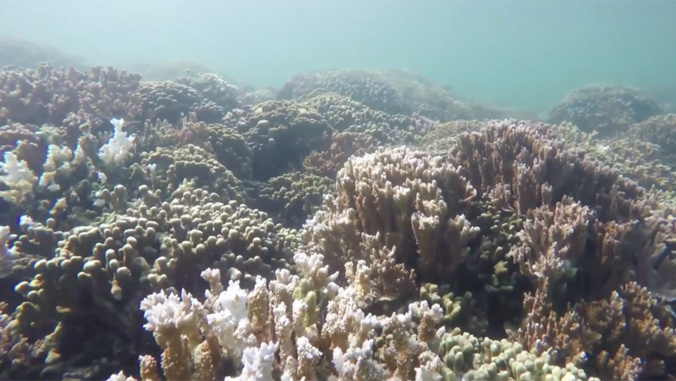50% Of Earth’s Coral Reefs Face Climate Change Threat By 2035
Under a worst-case scenario, half of coral reef ecosystems worldwide will permanently face unsuitable conditions in just over a dozen years, if climate change continues unabated.
 That is one of the findings from new research published on October 11, in PLOS Biology by University of Hawaiʻi at Mānoa researchers. Unsuitable conditions will likely lead to the corals dying off and other marine life will struggle to survive due to disruptions in the food chain.
That is one of the findings from new research published on October 11, in PLOS Biology by University of Hawaiʻi at Mānoa researchers. Unsuitable conditions will likely lead to the corals dying off and other marine life will struggle to survive due to disruptions in the food chain.
“While the negative impacts of climate change on coral reefs are well known, this research shows that they are actually worse than anticipated due to a broad combination of climate change-induced stressors,” said lead author Renee O. Setter, a doctoral student in the Department of Geography and Environment in the College of Social Sciences. “It was surprising to find that so many global coral reefs would be overwhelmed by unsuitable environmental conditions so soon due to multiple stressors.”
Using an ensemble of global climate change models, the researchers compared scenarios of five environmental stressors projected from the 1950s through the year 2100. These stressors included sea surface temperature, ocean acidification, tropical storms, land use and human population. From prior studies, threshold values for the stressors that led to unsuitable environmental conditions for coral reefs were identified.
Key findings
- In 2035, 50% of the world’s coral reefs will be unsuitable when multiple stressors are considered. For example, one region may be experiencing higher sea surface temperature, while another region may be experiencing ocean acidification. If only an individual stressor is considered, such as sea surface temperature, on global reefs, fewer areas seem to be impacted as quickly, and this date is pushed back to 2050.
- By 2055, it is projected that almost all of the world’s coral reefs (99%) would be facing unsuitable conditions based on at least one of the five stressors studied.
- By 2100, it is anticipated that 93% of global reefs would be under threat by two or more stressors.
According to researchers, this study is the first that looks at multiple stressors in modeling and projection scenarios to show that the cumulative area that is impacted by any stressor is leading to a greater coverage of unsuitable conditions globally. This is creating a shorter timeline for remaining reefs as they can be vulnerable to one of many projected stressors that are quickly approaching.
Research team members are preparing to enter the next phase of their work, which will take a closer look at how climate change is projected to affect individual coral species. By identifying which species are more likely to survive unsuitable conditions and which may be more vulnerable, the team hopes to better understand which species may be more at risk to future stressors.
In addition to Setter and Franklin, co-authors include Department of Geography and Environment Professor Camilo Mora.
Publication: Renee O. Setter, et al. Co-occurring anthropogenic stressors reduce the timeframe of environmental viability for the world’s coral reefs. PLOS Biology, (2023). DOI: 10.1371/journal.pbio.3001821
Original Story Source: University of Hawaii at Manoa

 Alerts Sign-up
Alerts Sign-up